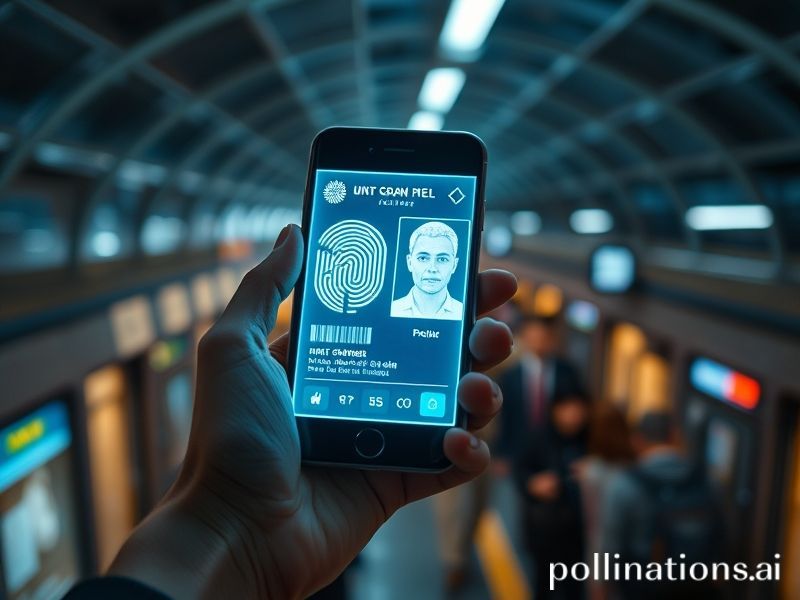Planet of the Scans: How Digital IDs Are Quietly Rebooting Humanity—One QR Code at a Time
In Singapore, where efficiency is a national sport, citizens can now board a flight, vote, and buy durian at 3 a.m. using nothing more than a QR code and a stoic expression. Half a planet away, Estonia—population 1.3 million, mood perennially Nordic—has turned its entire population into de facto e-residents, allowing anyone with a passport and a suspiciously fast internet connection to incorporate a company without ever learning how to pronounce “Tallinn.” Meanwhile, Nigeria’s digital ID program cheerfully enrolls a populace that still queues for petrol during shortages, proving that optimism and bureaucracy can coexist like vodka and regret.
Welcome to the age of the Digital ID, humanity’s latest attempt to reduce seven billion messy stories into a single, scannable bar. It’s sold as frictionless living: no more fumbling for passports, birth certificates, or those increasingly quaint objects once known as “keys.” Instead, your iris, fingerprint, vaccination status, credit score, and Spotify Wrapped are quietly stitched together into a tidy digital soul, ready to be waved at a sensor like a white flag.
The sales pitch is global. The World Bank—an institution whose initials might as well stand for “We’ll Bankroll Anything”—has poured over a billion dollars into ID projects under the soothing mantra of “financial inclusion.” Translation: if we can just get the world’s unbanked to surrender a thumbprint, perhaps they’ll finally borrow enough micro-loans to buy a smartphone on which to receive more micro-loans. Kenya’s Huduma Namba, India’s Aadhaar, and the EU’s forthcoming “European Digital Identity Wallet” all promise the same miracle: turning every human into a verifiable node on someone’s ledger. The ledger, naturally, belongs to the people—by which we mean whichever consortium wins the next procurement tender.
Of course, skeptics point to the darker plot twists. India’s biometric database, built to stop “ghost beneficiaries” from stealing subsidized rice, has occasionally denied rations to very corporeal grandmothers whose fingerprints have faded after decades of honest toil. In Uganda, President Museveni—whose hobbies include long walks on the Nile and winning elections with 110% turnout—has cheerfully leveraged national IDs to prune the voter rolls. And in China, the social-credit pilot programs have gamified obedience so effectively that jaywalkers find their dating-app matches replaced by municipal slogans. The game comes with collectibles: blacklists.
Yet the real spectacle is watching democracies attempt the same trick while wearing a sheepish grin. Canada’s federal digital credential, dubbed the “Verified.Me” network, assures citizens their data is “held by you, not us,” which is a comforting sentence until you read the fine print about “trusted partners.” Trusted, presumably, in the same way one trusts a casino to offer fair odds. Across the Atlantic, the United Kingdom—fresh from digitally exiting Europe—now wants to re-enter the 21st century with a digital ID scheme whose working title, “GOV.UK One Login,” sounds like a rejected boy-band single.
Developing nations aren’t mere guinea pigs; they’re the R&D department. When the Philippines rolled out its national ID during a pandemic lockdown, queues stretched longer than a telenovela plotline, offering a live demo of how desperation makes privacy feel like a luxury good. Meanwhile, the Gulf states—where temperatures and surveillance budgets both hit 50°C—embed chips in residency cards so efficiently that a laborer can be deported with the same swipe used to buy karak chai.
The overarching irony, delicious enough to serve with a sprig of parsley, is that digital IDs were meant to end the tyranny of paperwork. Yet each new system spawns its own paperwork—terms-of-service scrolls no human has ever finished, consent pop-ups that make Faust look prudent, and password requirements so Byzantine they require a PhD in semiotics. We traded our filing cabinets for clouds, only to discover the clouds are owned by someone who also sells umbrellas.
In the end, the Digital ID is neither dystopian nightmare nor utopian skeleton key. It’s a mirror: reflect whatever regime happens to be holding it. Somewhere between Estonia’s e-democracy and Xinjiang’s e-detention camps lies the uncomfortable truth that a QR code is just a barcode that learned to smile. Scan wisely.







